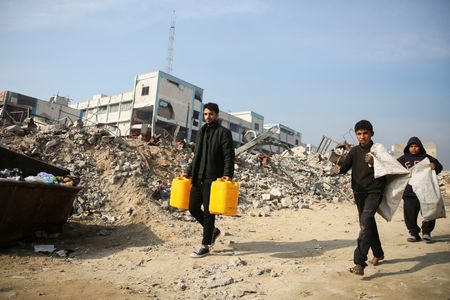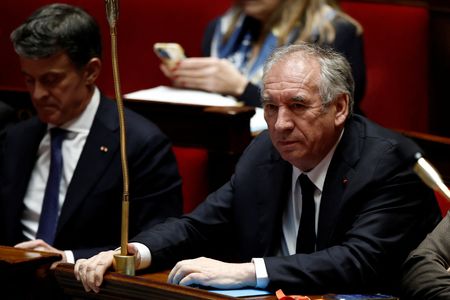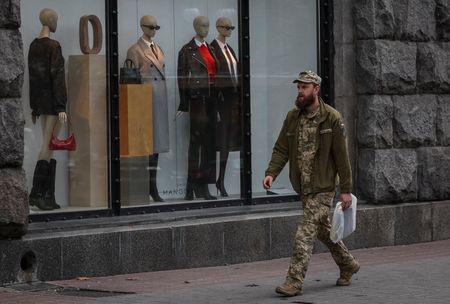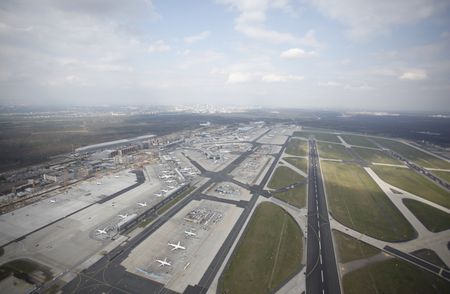By Andrew Mills, Nidal al-Mughrabi and Maayan Lubell
DOHA/CAIRO/JERUSALEM (Reuters) – Israel said it had delayed holding a cabinet meeting on Thursday to ratify a ceasefire with Hamas, blaming the militant group for the hold-up, as Palestinian authorities said Israeli airstrikes overnight had killed 77 people in Gaza.
Hamas senior official Izzat el-Reshiq said the group remained committed to the ceasefire deal, agreed a day earlier, that was scheduled to take effect from Sunday to bring an end to 15-months of bloodshed.
President Joe Biden’s envoy Brett McGurk and President-elect Donald J. Trump’s envoy Steve Witkoff were in Doha with Egyptian and Qatari mediators working to resolve the last remaining dispute, a U.S. official, who spoke on condition of anonymity, said.
The dispute involves the identities of several prisoners Hamas is demanding be released and it is expected to be resolved soon, the U.S. official said.
Israeli government spokesperson David Mencer told reporters Israeli negotiators were in Doha to reach a solution.
The complex ceasefire accord emerged on Wednesday after mediation by Qatar, Egypt and the U.S. to stop the war that has devastated the coastal territory and inflamed the Middle East.
The deal outlines a six-week initial ceasefire with the gradual withdrawal of Israeli forces from the Gaza Strip, where tens of thousands have been killed. Hostages taken by militant group Hamas, which controls the enclave, would be freed in exchange for Palestinian prisoners detained in Israel.
The deal also paves the way for a surge in humanitarian aid for Gaza, where the majority of the population has been displaced and is facing acute food shortages, food security experts warned late last year.
Rows of aid trucks were lined up in the Egyptian border town of El-Arish waiting to cross into Gaza, once the border is reopened.
Israel’s acceptance of the deal will not be official until it is approved by the country’s security cabinet and government, and a vote had been slated for Thursday.
However, Israeli Prime Minister Benjamin Netanyahu has delayed the meeting, accusing Hamas of making last-minute demands and going back on agreements.
“The Israeli cabinet will not convene until the mediators notify Israel that Hamas has accepted all elements of the agreement,” a statement from Netanyahu’s office said.
Hardliners in Netanyahu’s government were still hoping to stop the deal, though a majority of ministers were expected to back it.
Finance Minister Bezalel Smotrich’s Religious Zionism Party said in a statement that its condition for remaining in the government would be a return to fighting at the end of the first phase of the deal, in order to destroy Hamas and bring all the hostages back. Far-right police minister Itamar Ben-Gvir has also threatened to quit the government if the ceasefire is approved.
In Jerusalem, some Israelis marched through the streets carrying mock coffins in protest at the ceasefire, blocking roads and scuffling with police.
Despite the hold-up to the cabinet meeting, political commentators on Israel’s public broadcaster Kan said the latest delay would likely be resolved and that the ceasefire was a done deal.
CALLS FOR FASTER IMPLEMENTATION
For some Palestinians, the deal could not come soon enough.
“We lose homes every hour. We demand for this joy not to go away, the joy that was drawn on our faces – don’t waste it by delaying the implementation of the truce until Sunday,” Gazan man Mahmoud Abu Wardeh said.
The accord requires 600 truckloads of humanitarian aid to be allowed into Gaza every day of the ceasefire, with 50 carrying fuel. The first phase of the agreement will also see Israel releasing more than 1,000 Palestinian prisoners.
While people celebrated the pact in Gaza and Israel, Israel’s military conducted more attacks, the civil emergency service and residents said.
Gaza’s health ministry said at least 81 people had been killed over the past 24 hours and about 188 injured. The Palestinian Civil Emergency Service said at least 77 of those were killed since the ceasefire announcement.
The Israeli military is looking into the reports, a military spokesperson said.
Israel secured major gains over Iran and its proxies, mainly Hezbollah, as the Gaza conflict spread. In Gaza, however, Hamas may have been crippled, but without an alternative administration in place, it has been left standing.
If successful, the ceasefire will halt fighting that has razed much of heavily urbanised Gaza, killed over 46,000 people, and displaced most of the tiny enclave’s pre-war population of 2.3 million, according to Gaza authorities.
That in turn could defuse tensions across the wider Middle East.
With 98 foreign and Israeli hostages remaining in Gaza, phase one of the deal entails the release of 33 of them, including all women, children and men over 50.
Global reaction to the ceasefire was enthusiastic.
Israel launched its campaign in Gaza after Hamas-led gunmen burst into Israeli border-area communities on Oct. 7, 2023, killing 1,200 soldiers and civilians and abducting over 250 hostages, according to Israeli tallies.
(Reporting by Andrew Mills in Doha, Nidal al-Mughrabi in Cairo, Maayan Lubell in Jerusalem, Jana Choukeir, Clauda Tanios and Nayera Abdallah in Dubai; additional reporting by James Mackenzie and Emily Rose, Howard Goller, Ramadan Abed, Steve Holland and Alexander Cornwell; Writing by Cynthia Osterman and Michael Georgy; Editing by Stephen Coates and Sharon Singleton)
















